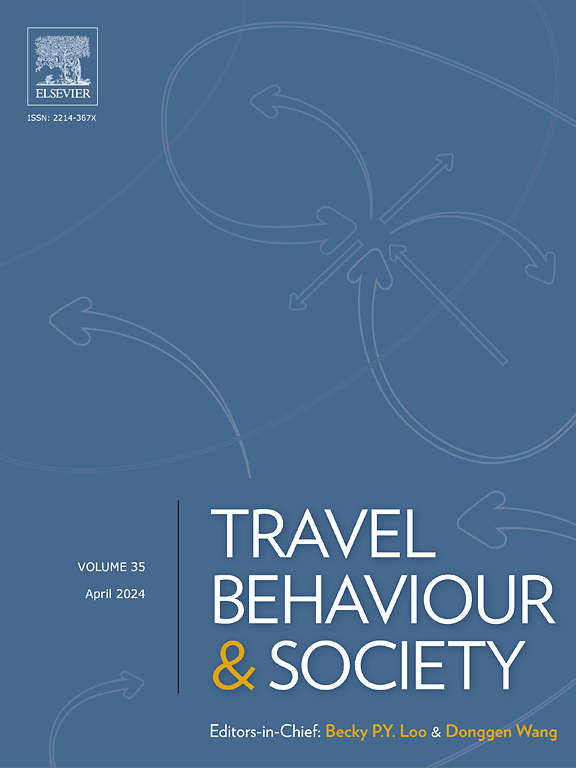基于服务机会可及性和多源城市数据的无桩共享单车公平性分析
IF 5.7
2区 工程技术
Q1 TRANSPORTATION
引用次数: 0
摘要
共享单车是一种方便、可持续的交通方式,在促进绿色出行和改善可达性方面具有巨大潜力。然而,共享单车服务的空间不平等往往阻碍了这些好处的充分实现。虽然有许多研究从公平的角度考察了共享单车服务,但大多数研究都侧重于使用共享单车设施,而忽视了用户使用共享单车到达他们喜欢的城市目的地的能力。为了解决这一差距,本研究引入了一种增强的可达性模型,即服务机会可达性(SOA),该模型将城市共享单车出行机会的吸引力和可达性结合起来。利用基于核密度的平衡浮动集水区(KDBFCA)方法,我们基于无桩共享单车服务为用户提供的效用来评估其公平性。基于多源城市数据,应用该模型对宁波市无桩共享单车的公平性进行了评估。结果显示了空间和人口上的不平等,弱势群体(包括生活在周边地区和非本地居民)的可达性水平较低。这些发现强调,需要制定更具包容性的城市交通政策,以提高无桩共享单车服务的公平性。本文章由计算机程序翻译,如有差异,请以英文原文为准。
Analysing the equity of dockless bike-sharing based on service-opportunity accessibility and multi-source urban data
Bike-sharing is a convenient and sustainable transport mode with significant potential for promoting green travel and improving accessibility. However, spatial inequities in bike-sharing services often prevent these benefits from being fully realised. While numerous studies have examined bike-sharing services from an equity perspective, most focus on accessing bike-sharing facilities but overlook users’ ability to reach their preferred urban destinations using shared bikes. To address this gap, this study introduces an enhanced accessibility model, namely, service-opportunity accessibility (SOA), a measure which incorporates the attractiveness and accessibility of urban opportunities for bike-sharing trips. Using the kernel density-based balanced floating catchment area (KDBFCA) method, we evaluate the equity of dockless bike-sharing services based on the utility they provide to users. Based on multi-source urban data, we apply this model to assess the equity of dockless bike-sharing in Ningbo, China. The results reveal spatial and demographic inequities, with disadvantaged groups, including those living in peripheral areas and non-local residents, experiencing lower levels of accessibility. These findings underscore the need for more inclusive urban transport policies to enhance the equity of dockless bike-sharing services.
求助全文
通过发布文献求助,成功后即可免费获取论文全文。
去求助
来源期刊

Travel Behaviour and Society
TRANSPORTATION-
CiteScore
9.80
自引率
7.70%
发文量
109
期刊介绍:
Travel Behaviour and Society is an interdisciplinary journal publishing high-quality original papers which report leading edge research in theories, methodologies and applications concerning transportation issues and challenges which involve the social and spatial dimensions. In particular, it provides a discussion forum for major research in travel behaviour, transportation infrastructure, transportation and environmental issues, mobility and social sustainability, transportation geographic information systems (TGIS), transportation and quality of life, transportation data collection and analysis, etc.
 求助内容:
求助内容: 应助结果提醒方式:
应助结果提醒方式:


